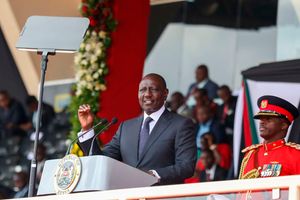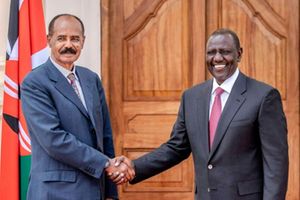Premium
What to expect as Raila takes part in AU debate tonight
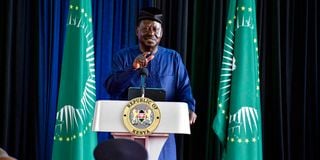
Kenya's Raila Odinga makes his remarks during the launch of his bid for the African Union Commission Chairmanship candidate at State House, Nairobi on August 27, 2024.
When three candidates for the African Union Commission (AUC) Chairperson’s seat take part in a public debate today (Friday), they will not only be explaining their vision and agenda but will also be showcasing their public speaking skills. Most importantly, they will be addressing the public directly for the first time on a joint platform ahead of the February 2025 elections.
Why the debate
The African Union, as part of its reforms, launched the debate - dubbed Mjadala Afrika - in 2017 to allow candidates to respond to moderated questions as well as defend their vision before an African audience. The idea, the AU argued, was to bring the leadership of the continental bloc closer to the people and remove the wall of secrecy that has barricaded the organisation for years.
Yet, this will only be the second time such a debate has happened in seven years, a result of a single candidate competing for re-election in 2021: Moussa Faki Mahamat of Chad.
The debate, AU says, will provide a vital platform for candidates to discuss their visions and proposals for addressing the continent's most pressing challenges.
“The debate focuses on policy issues and a solutions-oriented engagement on how each candidate intends to advance realisation of the Aspirations and Goals of Agenda 2063, other AU projects with continental focus, and Common African Positions.”
The candidates
On Friday, Kenya’s former Prime Minister Raila Odinga will take to the podium against Djibouti’s Foreign Minister Mahmoud Ali Youssouf and Madagascar's former Foreign Minister Richard James Randriamandrato.
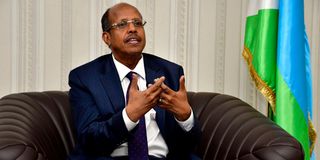
Djibouti Minister of Foreign Affairs and International Cooperation Mahmoud Ali Youssouf.
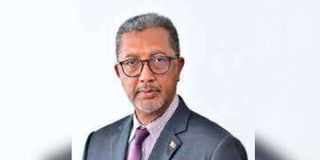
Madagascar's former Foreign Minister Richard James Randriamandrato.
The former Mauritius Foreign Affairs Minister, Anil Kumarsingh Gayan, withdrew his candidature early in the month. It is still a men-only contest, meaning the next deputy chairperson is sure to be a woman (AU rules of procedure forbid the same gender occupying chair and deputy at the same time).
The moderators
Back to the debate, the session will be moderated by Canada-based Ghanian Anita Erskine, who doubles as the Executive Director of Erskine Global Communications, and Algerian journalist Fatima Charef. In 2017, organisers brought in a woman and a man to moderate. This will be the first all-female moderated debate.
The three candidates have spoken of economic transformation, enhancing trade, financial independence, gender equity, agricultural transformation and climate action. Others are integration and peace and security. Overall, the three have hinged Africa’s development to peace and stability and ending wars.
Responding to questions
The candidates will have to explain to an audience, composed mostly of youthful Africans, how they will translate policies into action. They may also respond to a set of questions from a virtual audience, although some will also be allowed in the hall in Addis Ababa, the venue of the debate.
For most of the chairperson’s role, however, he acts on decisions of the Assembly of heads of state and government, the highest decision-making organ of the bloc.
Mjadala Afrika means "African Debate” in Swahili.
“These discussions are particularly relevant as Africa seeks to navigate a rapidly changing global landscape,” according to a dispatch from the African Union Commission.
“The platform represents an important moment for democratic engagement in Africa.”
The debate will feature a panel of candidates who will respond to questions posed by two moderators — one English and another French speaking.
“This interactive format is designed to encourage transparency and foster direct engagement between candidates and the African people. Each candidate will have the opportunity to present their vision and elaborate on their policy proposals,” says the AU.
Each of the three candidates hope to succeed Mr Faki who has served his second and final term.
Languages of the debate
The debate will be conducted in all the six official working languages of the AU — English, French, Arabic, Portuguese, Spanish and Swahili. Simultaneous interpretation will be provided to the candidates and the audience as well as the broadcast and digital platform channels.
The debate will be televised from 7pm to 9pm East African Time (EAT), at the African Union Headquarters in Addis Ababa, Ethiopia.
The 2024 edition of the Mjadala Afrika will set the momentum for the election that will take place in February 2025.
The upcoming elections will take place during the next Assembly.
The first debate of this kind was held in December 2016 when five candidates vying for the position of AUC Chairperson participated in the live televised debate. The second, which would have been held in 2020, did not take place "as there was only one candidate vying for the position of the Chairperson of the AU Commission in a re-election bid,” said AU.




